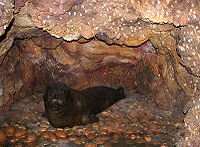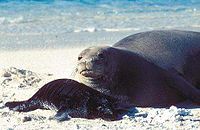Monk seals
|
Scientific Classification Kingdom: Anamalia (Animals) |
Monk Seals (scientific name: Monachus) is a genus of three species within the family of True seals (which includes nineteen species):
- Mediterranean monk seal (Monachus monachus)
- Hawaiian monk seal (Monachus schauinslandi)
- Caribbean monk seal (also West Indian Monk sea, West Indian seal) ( Monachus tropicalis) - believed extinct
Together with the families of Eared seals and Walruses, True seals form the group of marine mammals known as pinnipeds.
The Mediterranean monk seal was described by Aristotle, as the first known written description of a pinniped. The head of a monk seal appeared on one of the earliest minted coins, around 500 BC. The Caribbean monk seal was first noted by Christopher Columbus. All three species have been hunted in the past and been severely impacted by humans. The last sighting of a Carribean monk seal occurred in 1952.
Distribution
- Mediterranean monk seal - Once widespread throughout the Mediterranean, the Black Sea and the northwestern coast of Africa, it is now restricted to a handful of small and scattered colonies in the Ionian and Aegean Seas and the southern coast of Turkey in the Mediterranean Sea, as well as scattered populations on the [[coast]s] of the western Sahara and Mauritania, and the Portuguese Desertas Islands, Madeira.
- Hawaiian monk seal - Northwestern Hawaiian Islands
- Caribbean monk seal - formerly the tropical waters of the Florida Keys, the Bahamas, the Greater and Lesser Antillies, around the Yucatan Penninsula, and around offshore islets and atolls.
Conservation Status
- Mediterranean monk seal- one of the most endangered mammals in the world. There are probably 350 to 450 individuals remaining. It is estimated that there were twice this number 20 years ago.
- Hawaiian monk seal - extensively hunted during the nineteenth century and were earlier thought to be extinct. They were declared endangered in the year 1976. Downward counts in the population seemed to be reversed in the 1980's, and the count is now approximately 1200 individuals.
- Caribbean monk seal - The last recorded sighting was in 1952. Although there are still unconfirmed sightings in Caribbean areas, two expeditions in search of Caribbean monk seals failed to produce any evidence, and it is believed that this species is now extinct.
For details, see Mediterranean monk seal, Hawaiian monk seal, and'Caribbean monk seal.
| Conservation Status | Conservation Status | Conservation Status |
Further Reading
- Monachus monachus (Hermann, 1779) Encyclopedia of Life (accessed July 18, 2010)
- Monachus schauinslandi Matschie, 1905 Encyclopedia of Life (accessed July 18, 2010)
- Monachus tropicalis (Gray, 1850) Encyclopedia of Life (accessed July 18, 2010)
- Monachus monachus, Benton, M., 2000, Animal Diversity Web (accessed July 18, 2010)
- Monachus schauinslandi, Lambert, J. and I. Rouse, 1999, Animal Diversity Web (accessed July 18, 2010)
- Monachus tropicalis, Davies, L., 2008, Animal Diversity Web (accessed July 18, 2010)
- Mediterranean monk seal, Seal Conservation Society (accessed July 18, 2010)
- Hawaiian monk seal , Seal Conservation Society (accessed July 18, 2010)
- Caribbean monk seal, Seal Conservation Society (accessed July 18, 2010)
- Monachus monachus, IUCN Red List of Threatened Species (accessed July 18, 2010)
- Monachus schauinslandi, IUCN Red List of Threatened Species (accessed July 18, 2010)
- Monachus tropicalis, IUCN Red List of Threatened Species (accessed July 18, 2010)
- Mediterranean monk seal, MarineBio.org (accessed July 18, 2010)
- Hawaiian monk seal, MarineBio.org (accessed July 18, 2010)
- Caribbean monk seal, MarineBio.org (accessed July 18, 2010)
- The Pinnipeds: Seals, Sea Lions, and Walruses, Marianne Riedman, University of California Press, 1991 ISBN: 0520064984
- Encyclopedia of Marine Mammals, Bernd Wursig, Academic Press, 2002 ISBN: 0125513402
- Marine Mammal Research: Conservation beyond Crisis, edited by John E. Reynolds III, William F. Perrin, Randall R. Reeves, Suzanne Montgomery and Timothy J. Ragen, Johns Hopkins University Press, 2005 ISBN: 0801882559
- Walker's Mammals of the World, Ronald M. Nowak, Johns Hopkins University Press, 1999 ISBN: 0801857899




